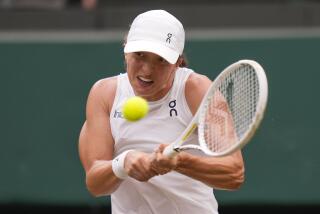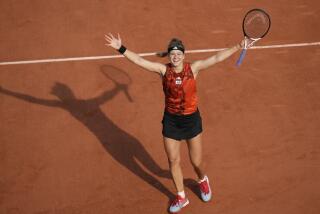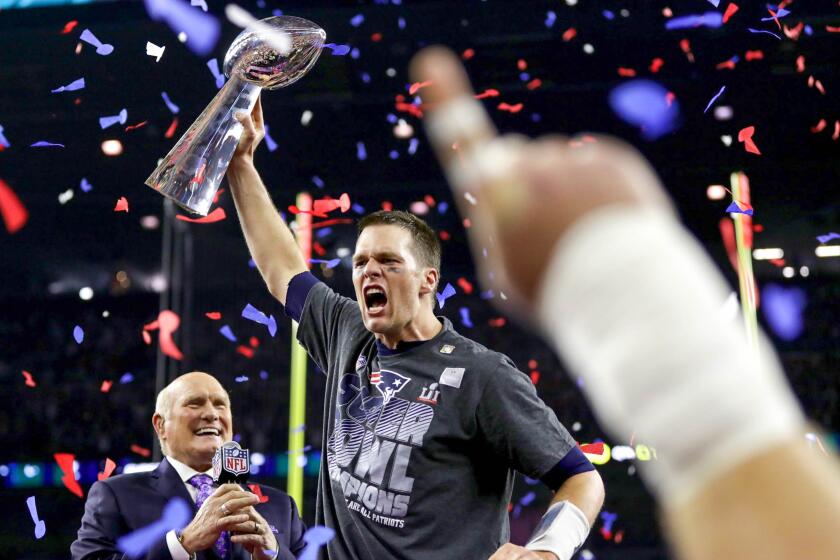They’ve Put Soviet Union Back on Tennis Map : Chesnokov, Zvereva Are Like So Many Other Young Players, but Also Different
- Share via
NEW YORK — They talk about their No. 1 male tennis player with admiration, tinged with a bit of exasperation. He’s so difficult to tell what to do, they say, so independent and unpredictable from the time he was a youngster.
The No. 1 female tennis player in their country often wears a jean jacket, sporting a Madonna button. Her collection of T-shirts includes one with a drawing of the lead singer of a-ha on the front. Any disappointments for this 16-year-old? Missing a Genesis concert in London because she had to play a junior final.
Andrei Chesnokov and Natalia Zvereva. Yeah, that gives it away. Although, from all accounts, they sound like just another couple of independent and sometimes nutty teen-agers, these two are anything but.
They are being watched closely on all fronts. At home, back in the Soviet Union; here, in the United States, they can’t disappear into the anonymity of the computer rankings.
When Zvereva reached the third round of women’s singles at the U.S. Open here, former tour player and Russian coach Olga Morozova spent the better part of two days giving interviews to American and foreign reporters. Although Chris Evert beat Zvereva, 6-0, 6-2, later on Sunday, Chesnokov advanced to the fourth round, defeating Diego Perez of Uruguay, 6-1, 6-2, 6-3.
Despite the loss, Zvereva has established herself as the first bona fide Soviet star since Morozova. And, at last year’s Open, Chesnokov made his mark by reaching the round of 16.
He has become the first male Soviet player of any significance since Alex Metreveli reached the Wimbledon final in 1973. Between Metreveli and Morozova and the new generation, led by Chesnokov and Zvereva, there is a long empty space in Soviet international tennis history.
A mere two years after Morozova had reached the Wimbledon final (losing to Evert in 1974), the Soviets pulled out of worldwide competition. The move was made because the Soviets feared reprisals from other countries because they had permitted their players to participate on a tour that included South Africa.
Now, 11 years later, the Soviets are in the midst of a full-fledged campaign to elevate their tennis program to a higher level, eventually hoping to challenge the United States and other European countries for tennis supremacy.
Which brings us to the reason behind the change in philosophy. Between 1976-1982, there were no Soviets playing on the tennis tour. However, tennis became an Olympic sport again. It was held as a demonstration sport in 1984, and Steffi Graf and Stefan Edberg won the singles titles. Now, in 1988, tennis has regained its status as a medal sport.
“The Olympics?” Zvereva said. “Yes, they are very important. For me, they are bigger than winning Wimbledon and the U.S. Open. I do not know why. Maybe because in the other sports in USSR, the Olympics are bigger.”
To achieve this end, the Soviets enlisted the help of the capitalists. About a year and a half ago, the federation signed a deal with ProServ, an American management group based in Washington. ProServ, whose chief executive officer, Donald Dell, was one of the first Americans to play in the Soviet Union, represents about 50 Soviet tennis players. The firm negotiated an endorsement agreement with Nike last May. It was the first time that a Russian sports team had endorsed products from an American-based manufacturer.
Zvereva, for one, likes the new clothes and shoes. She proudly sported her new outfits at the recent Soviet National championships earlier this summer.
“It was . . . how you say? It was hippy to wear Nike there,” she said.
Chesnokov, known for freely speaking his mind, wasn’t so sure about the new apparel. He said there were other kinds of clothing he prefers, including Nike rival Adidas’ line of sporting garb.
In the past, Chesnokov’s words have frequently gotten him in trouble with the Soviet authorities. He once told reporters that he gets to keep a large portion of his prize money and was reportedly reprimanded for making that statement.
His coach, Tatnyna Naumko, isn’t surprised by anything Chesnokov does or says. She has been with him since he was eight years old, after spotting him in a physical education class. She saw something and gave him special tests, and out of a group of youngsters, Naumko determined he was the best.
“It has been difficult with him” she told several reporters, using Morozova as an interpreter. “He’s a very individual person. Many times (we clash). For us, each day it’s a different thing.”
Chesnokov doesn’t describe himself in those terms, only calling himself a regular guy. He says just that he doesn’t like extravagant behavior.
“I am on ordinary guy who likes to play tennis,” he said. “But I like to have fun, too.”
He isn’t just an ordinary tennis player. In New York, Chesnokov spent an afternoon at the Museum of Natural History. “I like old things,” he said. Then, Chesnokov spent about six hours wandering around the streets of Manhattan.
He wasn’t worried about running into dangerous situations by himself.
“I have been to United States many times,” Chesnokov said. “I want to see things.”
He understands English but usually prefers to use an interpreter to translate his answers to the questioners. He first burst onto the international scene at the 1986 French Open, defeating two-time champion Mats Wilander in a third-round match. At the U.S. Open last year, he reached the fourth round, defeating Mikael Pernfors before losing to American Tim Wilkison.
Unlike before, other Soviet men have started to attract attention this year. Alexander Volkov reached the fourth round at Wimbledon and upset Brad Gilbert in an earlier round.
At this point, though, the women are farther along than the men. Larisa Savchenko and Svetlana Parkhomenko are one of the world’s best doubles teams and upset the No. 1 team of Martina Navratilova and Pam Shriver in straight sets at Wimbledon.
Zvereva made a big spash by knocking off Lori McNeil on her way to a fourth-round meeting with top-10 player Gabriela Sabatini. She has won the French and Wimbledon junior titles and is trying to take the third leg of a Grand Slam here.
But for Morozova and Zverva, the match against Evert was a special moment. Morozova and Evert are close firends and played doubles together.
Afterward, Evert approached the old guard of Soviet tennis, Morozova, and talked about the new wave.
“She said to me, ‘Natalia is great,’ ” Morozova said. “She told me, ‘Olga, I have to say she is going to be very good.’ I’m very happy she said that to me.”
More to Read
Go beyond the scoreboard
Get the latest on L.A.'s teams in the daily Sports Report newsletter.
You may occasionally receive promotional content from the Los Angeles Times.











